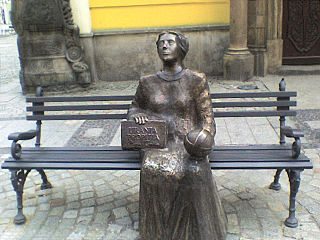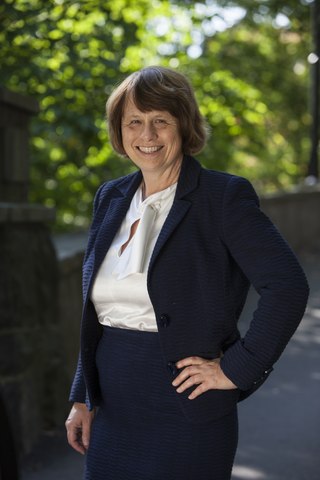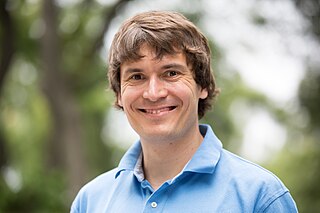Related Research Articles

The Royal Astronomical Society (RAS) is a learned society and charity that encourages and promotes the study of astronomy, solar-system science, geophysics and closely related branches of science. Its headquarters are in Burlington House, on Piccadilly in London. The society has over 4,000 members ("Fellows"), most of them professional researchers or postgraduate students. Around a quarter of Fellows live outside the UK.

Aleksander Wolszczan(listen) is a Polish astronomer. He is the co-discoverer of the first confirmed extrasolar planets and pulsar planets.

Bohdan Paczyński or Bohdan Paczynski was a Polish astronomer notable in the theory of the stellar evolution, accretion discs, and gamma ray bursts.

Michel Gustave Édouard Mayor is a Swiss astrophysicist and professor emeritus at the University of Geneva's Department of Astronomy. He formally retired in 2007, but remains active as a researcher at the Observatory of Geneva. He is co-laureate of the 2019 Nobel Prize in Physics along with Jim Peebles and Didier Queloz, and the winner of the 2010 Viktor Ambartsumian International Prize and the 2015 Kyoto Prize.

The Gold Medal of the Royal Astronomical Society is the highest award given by the Royal Astronomical Society (RAS). The RAS Council have "complete freedom as to the grounds on which it is awarded" and it can be awarded for any reason. Past awards have been given for "outstanding personal researches in the fields of astronomy and geophysics" as well as general contributions to astronomy and geophysics "that may be made through leadership in research programmes, through education and through scientific administration". It has been awarded both for research that has taken a lifetime, and for specific pieces of research.

Konrad Rudnicki was a Polish astronomer, professor at the Jagiellonian University in Kraków, and a priest of the Old Catholic Mariavite Church.

Maria Cunitz or Maria Cunitia was an accomplished Silesian astronomer, and the most notable female astronomer of the early modern era. She authored a book Urania propitia, in which she provided new tables, new ephemera, and a simpler working solution to Kepler's second law for determining the position of a planet on its elliptical path. The Cunitz crater on Venus is named after her. The minor planet 12624 Mariacunitia is named in her honour.

Ewine Fleur van Dishoeck is a Dutch astronomer and chemist. She is Professor of Molecular Astrophysics at Leiden Observatory, and served as the President of the International Astronomical Union (2018–2021) and a co-editor of the Annual Review of Astronomy and Astrophysics (2012–present). She is one of the pioneers of astrochemistry, and her research is aimed at determination of the structure of cosmic objects using their molecular spectra.
Astronomia.pl was a Polish portal about astronomy and space research created in 2001 and worked until 2015. It was the largest portal about astronomy and space in Poland in the years of its activity, and it was reaching 100 000 users monthly. The portal hosted over 3000 articles. The full name of Astronomia.pl was Polish Astronomy Portal. The website was run in Polish, however a small part of it was also in English.

Reinhard Genzel is a German astrophysicist, co-director of the Max Planck Institute for Extraterrestrial Physics, a professor at LMU and an emeritus professor at the University of California, Berkeley. He was awarded the 2020 Nobel Prize in Physics "for the discovery of a supermassive compact object at the centre of our galaxy", which he shared with Andrea Ghez and Roger Penrose. In a 2021 interview given to Federal University of Pará in Brazil, Genzel recalls his journey as a physicist; the influence of his father, Ludwig Genzel; his experiences working with Charles H. Townes; and more.

David Morrison is an American astronomer, a senior scientist at the Solar System Exploration Research Virtual Institute, at NASA Ames Research Center in Mountain View, California. Morrison is the former director of the Carl Sagan Center for Study of Life in the Universe at the SETI Institute and of the NASA Lunar Science Institute. He is the past Director of Space at NASA Ames. Morrison is credited as a founder of the multi-disciplinary field of astrobiology. Morrison is best known for his work in risk assessment of near Earth objects such as asteroids and comets. Asteroid 2410 Morrison was named in his honor. Morrison is also known for his "Ask an Astrobiologist" series on NASA's website where he provides answers to questions submitted by the public. He has published 12 books and over 150 papers primarily on planetary science, astrobiology and near Earth objects.
Wilhemina Iwanowska was born in Vilnius (Wilno). Iwanowska was an astronomer and the first astrophysics professor in Poland. Iwanowska was pioneer of astrophysics in Polish science.
Urania – Postępy Astronomii is a Polish astronomical magazine. The history of the magazine started with Uranja published by the Polish Society of Astronomy Amateurs in 1922. In 1936 the magazine changed its name to Urania due to reforms in Polish spelling. In 1998, Urania merged with Postępy Astronomii - a magazine of the Polish Astronomical Society, becoming Urania - Postępy Astronomii, a bi-monthly popular magazine about astronomy and space, continuing the volume numbering of Urania.

Anja Cetti Andersen is an astronomer and astrophysicist from Hørsholm, Denmark.

Dariusz Jemielniak is a professor of management at Kozminski University, faculty associate at the Berkman Klein Center for Internet & Society at Harvard University, and vice-president of Polish Academy of Sciences.
Astronarium is a Polish documentary and popular science television series about astronomy and space research. The program is produced by the Polish Television and Polish Astronomical Society, with support from the Polish Ministry of Science and Higher Education. The series premiered on March 2, 2015 on the TVP Regionalna channel. It has been broadcast on various channels in Poland and abroad, including TVP 1, TVP 3, TVP Polonia. The episodes are also available on the internet as a VOD, some of them with English subtitles. The cumulative audience in Poland during the first week of emission of an episode is on the level of 500 000 viewers.

Hiranya Vajramani Peiris is a British astrophysicist at University College London and Stockholm University, best known for her work on the cosmic microwave background radiation. She was one of 27 scientists who received the Breakthrough Prize in Fundamental Physics in 2018 for their "detailed maps of the early universe."

Janusz Kacprzyk is a Polish engineer and mathematician, notable for his contributions to the field of computational and artificial intelligence tools like fuzzy sets, mathematical optimization, decision making under uncertainty, computational intelligence, intuitionistic fuzzy sets, data analysis and data mining, with applications in databases, ICT, mobile robotics and others.

Agata Różańska is a Polish astronomer and astrophysicist. Research Professor at the field of X-ray astronomy. She works on numerical computations of emission processes in astrophysical X-ray sources and their observations.
References
- ↑ "Astronarium". Astronarium. Retrieved 2018-01-16.
- ↑ "Premierowy odcinek programu "Astronarium" w Telewizji Polskiej". 2015-02-23. Retrieved 2018-01-16.
- ↑ "Wybrano nowe władze Polskiego Towarzystwa Astronomicznego na lata 2017-2021". Press release of the Polish Astronomical Society. 2017-09-14. Retrieved 2018-01-16.
- ↑ "POLISHASTRONOMICALSOCIETY'(PAS)'" (PDF). Edwin Wnuk. European Astronomical Society. Retrieved 24 February 2014.
- ↑ "The history of astronomy in Poland until 1945". copernicus.torun. Retrieved 24 February 2014.
- ↑ "Medal Bohdana Paczyńskiego" . Retrieved 2018-12-01.
- ↑ "Medal im. Włodzimierza Zonna" . Retrieved 2018-12-01.